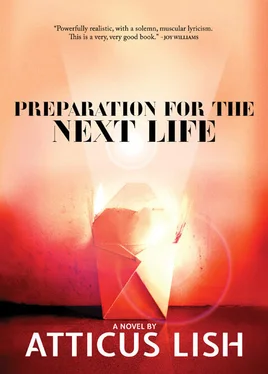Zhang Zhuojin came over to Zou Lei at eleven-thirty and said: You better talk to someone. That boy is squeezing you out.
She went to check the schedule. All her days were gone.
At lunch, the illegal women talked about it.
Better ask for justice from the boss.
Speak a sentence of justice to him.
Speak to him. She should, shouldn’t she?
She still has hope. The boss likes her.
The boss likes her and Sassoon likes the boy.
An old leopard ensnaring a young lynx.
Talk to Polo. Shake your flowers and branches at him.
Zou Lei went up front to talk to Sassoon. The high school kid was standing right there laughing with Angela. What you want? Sassoon said, and the others turned to listen. Zou Lei said, Nothing. I forget.
She stole a piece of steak and ate it surreptitiously in the back corridor where the deliveries came in and the Mexicans were cutting vegetables.
Chinita! Cuál es tu comida preferida?
Adiós, she told them, and went to shake their hands after she was done eating and had wiped her hands off with the napkin she had held the steak in.
Welbe put down his knife and held her hand. Where are you going? he asked in Spanish. In English: Where? He smiled off at possible places beyond the walls — an engraved cross on his front tooth. She noticed she was a hair taller than he was.
I find out, she said.
He was in his basement dreaming. He was aware of the presence of life even though it was not directly audible through the structures of buildings. His mind was aware. On the other side of the shingles, tiles and sheathing, the reinforced block, gypsum, Douglas fir and paper, there were people breathing, watching TV, wanting to live. They had vital signs, blood pressure, pulse. Shine a light in their eyes and their pupils would contract unless they had a brain injury or were in shock.
They were locked up tight right now, but if a firefight exploded on this street right now — and Skinner could see the tracers leaping overhead, that furious popping, popping up like burning golf balls, stapling through autobodies, glass exploding — you would hear them screaming for it to stop. In the morning you would see the blood on the splintered walls. You would see them come outside blinking, coming together, picking through the sharp things, wood and metal, talking about what to do. Standing in groups, they haven’t slept.
His dream evolved. The firing had stopped. He was walking through the wreckage of a street, glass crunching beneath his boots. Blood was mixed in the glass, sometimes bright and shining red, almost orange in the air. He saw the inside of a car splashed and splattered with flesh. There was nothing human left. What had been done to the bodies was not possible to reconstruct. They had been wrenched by giant hands, smashed, severed, filled with gas, perforated, burned, flung across space. A limb lay on a seat — arm or leg, no telling. He saw clothing. A pile of organs, a liver in the red clothes. A vertebra in the driver’s seat. Everything had been blasted free of its identity — shirt, pants, or robe — male or female — you couldn’t tell from clumped wet hair.
The vehicles were transformed as well, the heat having created rainbows in the body paint. Past the cars, he saw holes in the buildings, in the storefronts, tunnels leading in, glass blown out, brand-new sneakers in the street.
He was not alone. There was a crater in the sidewalk. He lay down and put his arm inside and clasped hands with the occupant of the pit and pulled him out. His body lifted easily — Skinner had the necessary strength. It was his friend at last. They shared a cigarette.
The next store was a Dunkin Donuts. They went inside, cleared away the glass with their boots, picked their way around the dead woman who was stuffed behind the counter and started taking donuts out of the tray.
They were starved and hungry.
Careful, dog.
Sconyers picked glass off Skinner’s donut before he bit it.
Is there coffee?
They found chocolate milk in the drink case. They found a booth to sit in at the back and lay their weapons on the table.
Goddamn this is a score.
Hell yeah, doggie.
Skinner put his boots up and crossed his ankles. His boot toes were brown with dried gore. He tapped them together.
I’m glad you didn’t die, man. Everything’s good in my world now, he said.
Skinner’s friend had changed since he had seen him last. In the dream, the colorful tattoos that had always decorated Sconyers’ arms had apparently spread, now flowing up his throat and covering his face in black spirals, scorpions, and thorns.

After she left the mall, she went to Footlocker and asked for a pair of Asics. The sales associate who helped her was so silent and unspeaking that she almost thought he didn’t speak English, or that he spoke a different dialect. It turned out he only talked to a narrow group of people — other blacks with whom he was friends. He looked right through her when she asked if they had a smaller size. Then his face came alive when someone came out of the stockroom and whooped. He hollered back, laughing and joking and full of comprehension. He told her to hold on, and went away.
She tried the shoes on and bounced on her toes. They made her feet feel spring-loaded. She stomped lightly on the carpeted floor.
The sales associate came back. Whenever she said anything, he pretended to be confused. What happened? he asked, meaning, What did you say?
How much the discount?
He wasn’t sure.
She tried to ask if you needed to have a social to work here.
Yeah, he said, and took the sneaker box up to the register.
She paid in cash, giving the young woman at the register a one hundred dollar bill. Zou Lei’s pay was issued in cash, usually in hundreds and fifties. The young woman, who had very dark skin, bumps on her cheeks, and a weave made of glossy black Chinese hair, took the bill. Then she seemed to forget what she was doing. She didn’t know how to ring the sale. She called out, How much do you take off on these? No one answered her. She made a snapping noise with her mouth. Her white eyes rolling at the boys, she murmured, They stupid.
A less-shy girl yelled, Yo! Malik!
What?
She asking you something. Tell her.
Malik said, No idea.
This whole time, the hundred dollar bill was in the woman’s hand and Zou Lei was watching it.
A manager came — a bigger man than all of them — an overweight unshaven man with a sloping head and sloping shoulders as if his entire body had melted down to his waist, and even his features had been affected, his eyes angling down, the sides of his mouth angling down like a picture of glumness — and then he spoke with this mouth in a businesslike and professionally courteous, corporate way. He told the woman what to do. The hundred dollars went into the drawer. The woman put the change on the counter. Zou Lei counted it. The woman said, Next.
Zou Lei wore the sneakers outside. They felt wonderful, comfortable and weightless, and as soon as she walked out of the store, she wanted to go back and ask for her money back.
You are stupid. You are so stupid.
SHE THOUGHT HE WAS taking her for something to eat and at that moment she believed she had never been so relieved to see him. They passed the Sheraton LaGuardia, the parking lot, a nightclub called the Ends of the Earth KTV, a play on words in Chinese, a pun on: the earth is wide.
She wanted to know where they were going, but he didn’t say.
They came to a block of three-story buildings and black iron fire escapes. There was an escort service on the top floor. One of the units had been sealed by the city marshal. In the basement, immigrants met to play mahjong for friendship and association, for business planning. They put spirit money in a brazier. They burned a car — a purple BMW the size of a shoebox that they bought from a Taoist temple. The temple specialized in helping you get what you wanted in the next life. They poked the ashes of the BMW with a metal rod to read the future.
Читать дальше













